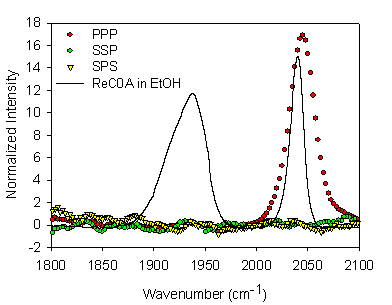AmericanChemicalSociety.com
Reports: ND6 49286-ND6: Vibrational Sum-Frequency Probe of Interfacial Electron Transfer Dynamics
Tianquan Tim Lian, Emory University
Interfacial electron transfer between molecular adsorbate and semiconductors is a fundamental process that is relevant to many important applications, such as solar cells, photocatalysis, and molecular electronics. To enable quantitative comparisons with theoretical studies, which are often carried out on single crystal surfaces with molecules at well-defined adsorption geometry, we are developing optical-vibrational sum-frequency-generation (VSFG) probe as a new approach to study ultrafast photoinduced electron transfer for molecules on well-characterized single crystal surfaces. In the first year of this funded research project, we have setup a broadband VSFG and have used it to study ReL0Cl(CO)3 [L0=4,4'-bipyridine-2,2'-COOH, or ReC0A] on the (001) rutile TiO2 single crystal surface. Shown in Figure 1 is the VSFG spectra in the CO stretching band region of ReC0A under various polarization combination. The SFG peak position is in good agreement with FTIR spectrum of this molecule in solution. By analyzing the polarization dependence of SFG signal, we determine that the adsorption geometry of the molecule. Comparison with theoretical calculation of this model system is ongoing. Ongoing experimental studies will focus on optical pump/VSFG probe measurement of interfacial electron transfer dynamics.
Figure 1. SFG spectra of ReC0A on (001) surface of rutile TiO2 single crystal measured at
indicated polarization combinations. Also shown for comparison is the FTIR
spectra of ReC0A in EtOH solution.

Copyright © American Chemical Society

